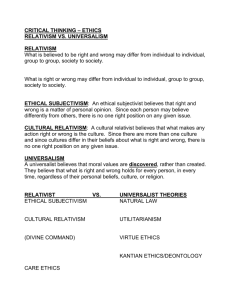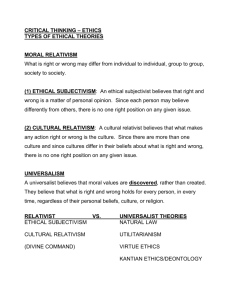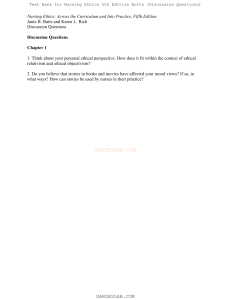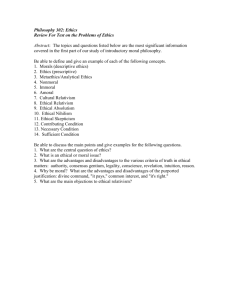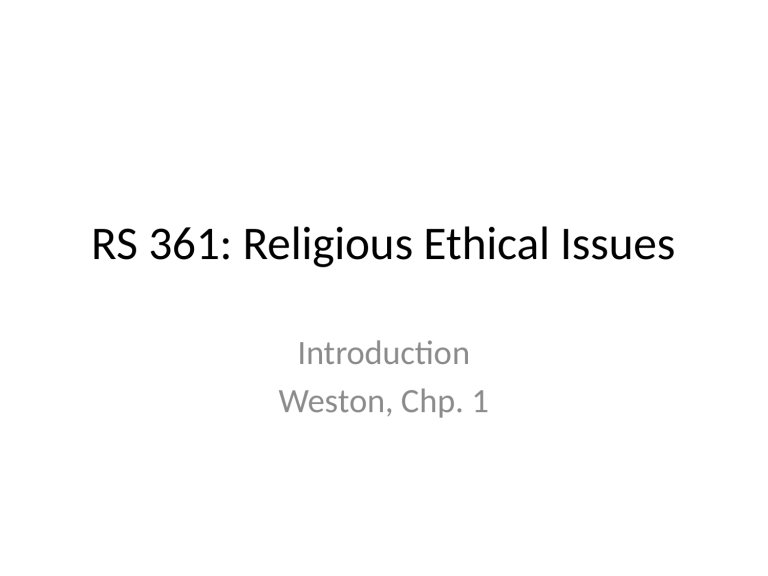
RS 361: Religious Ethical Issues Introduction Weston, Chp. 1 Getting Started • Group assignment class due at end of class. – Make sure you have discussed: What is the relationship between morals, values, commandments and ethics? – List three ethical issues that you have come across lately Ethics • Ethics is a learning experience— In what way? –Both words are important. –A personalizing of ethical values –Ethical awakenings Ethics defined • Ethics is concerned with the BASIC NEEDS and LEGITIMATE EXPECTATIONS of OTHERS as well as our own. – Basic needs: can include more that purely physical needs. – Legitimate expectations: include rights, but also societal expectations (acting responsibly, etc). – Problems with legitimate expectations? – Others Conceptualizing Ethics • Change and growth: Ethical changes over the course of American history. What’s needed? – Critical investigation- not just what we think! – Critical thinking requires that we generalize our reasons. – How ethical values as a whole hang together. • Creative problem solving in ethics (practical creativity) Avoidance disorders • Flying by instinct. – Feelings must be integrated with critical reflection/thinking. – Need to ask if our feelings are justified. – Need patience; feelings are manipulated by our own traditions along with the language and conceptual frameworks we use. • Off-hand justification Strategies to resist off-hand Justification • Its self-defeating – Watch for anger or irritation – Avoid the automatic counter-attack – Are trying to win or learn? • Everyone is selfish, but the extreme is psychological egoism. From this perspective it is reductionistic. Avoidance disorders • Instinct • Off-hand justification • Dogmatism- so committed to own moral beliefs that they cannot see the other side. – Commitment to certain values is good. – Dogmatism is an extreme position. Dogmatism • No distinctions between basic ‘givens’ of our moral life and everyday moral opinions that are not obvious. – Every moral opinion has same status as the 10 commandments, or the Quran, or the Adi Granth, etc. – Argument would not be necessary. – So a form of ethics avoidance. Why? Avoiding Dogmatism • • • • • Goal of ethics: moralism vs. critical thinking When you insist too strongly, take a breath. Seek out strategies on the other side. Don’t just focus on conclusions Avoid bumper sticker statements and easy labels. Avoidance disorders • • • • Instinct Off-hand justification Dogmatism Relativism- begins with different peoples/societies have different moral values. Agree? Relativism • Relativism is again an extreme position. • Continue to ask if any single standard is right. Agree? – Relativism is positive in making individual space. – But relativism can go further to the point of disorder. • Everything is just opinions. • All is equal so no need to argue. • So what would you call this? Relativism – Relativism privatizes thinking and stops discussion • Mind your own business • But usually your business affects others. – Relativism in the sense of descriptive relativism, is a good start because it helps make space to think for yourself. – Relativism in the sense of prescriptive relativism, that there is no single ‘right’ answer does not have to logically follow. • Maybe all the sides are wrong. • There may be no single ‘right’ answer because the moral situations are so complex that a variety of good responses are possible. In class assignment • Groups: using the ethical issues that your came up with, identify three and state these in as neutral a way as possible. • Give a couple of the best reasons on both sides of the issue • What is the relationship between morals, values, commandments and ethics? • Assignment for next week: How does dogmatism, rationalism and relativism affect a person’s view and practices of ethics?
